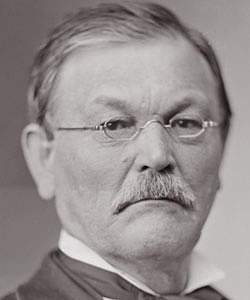James Kerr Kelly (Congressional Biographical Directory)
Reference
KELLY, James Kerr, a Senator from Oregon; born in Center County, Pa., February 16, 1819; attended the country schools and Milton and Lewisburg Academies; graduated from the College of New Jersey (now Princeton University) in 1839; studied law at Carlisle, Pa.; admitted to the bar in 1842 and commenced practice in Lewistown, Mifflin County, Pa.; deputy attorney general for Mifflin County, Pa.; went to the California gold fields in 1849, and later, in 1851, to Oregon Territory and settled in Portland, where he engaged in the practice of law; one of three commissioners for the codification of the Territorial laws in 1852; member, Territorial legislature 1853-1857, and was twice its president; lieutenant colonel of the First Regiment, Oregon Mounted Volunteers, in the Yakima Indian War in 1855 and 1856; a member of the State constitutional convention in 1857; member, State senate 1860-1864; unsuccessful candidate for election in 1864 to the Thirty-ninth Congress; unsuccessful candidate for election in 1866 for Governor of Oregon; elected as a Democrat to the United States Senate and served from March 4, 1871, to March 3, 1877; was not a candidate for reelection; chief justice of the State supreme court 1878-1882; resumed the practice of law in Portland, Oreg.; moved to Washington, D.C., in 1890 and continued the practice of law until his death there on September 15, 1903; interment in Rock Creek Cemetery.
"Kelly, James Kerr,” Biographical Directory of the United States Congress, 1774 to Present, http://bioguide.congress.gov/scripts/biodisplay.pl?index=K000074.
James Kerr Kelly (Dickinson Chronicles)
Scholarship
James Kelly was born in Blanchard on the northeastern edge of Centre County, Pennsylvania on February 16, 1819. He was educated at the Milton and Lewisburg Academies and took his undergraduate degree at Princeton University in 1839. He enrolled in the law department at Dickinson College in 1840 and gained his law degree in 1842. He began practice in Lewistown and soon was named under Governor Porter as the deputy attorney general for Mifflin County and then Juniata County when that county was carved from the larger.
When gold was discovered in California, Kelly became an enthusiastic "forty-niner" and traveled through Mexico and by sea to reach San Francisco in July 1849. He prospected in Calaveras County but soon abandoned the diggings for the practice of law in San Francisco. In 1851 he left for greener pastures and relocated to Oregon City in Oregon Territory. He was soon engaged as the chair of a legal commission codifying territorial laws in 1852 and then served from 1853-1857 in the territorial legislature, being elected its president during two terms. When the Yakima Indian War broke out in 1855 he raised a company in the Oregon Mounted Volunteers and was later elected colonel of the first regiment. He then was a member of the constitutional convention for Oregon statehood in 1857 and served in the new state's senate from 1860 to 1864. He had moved from Oregon City to The Dalles in the north-western part of the state where he was nominated as a Democrat in a race for the U.S. Congress in 1864 but was beaten by the Republican candidate, J. H. D. Henderson. He stood for governor in 1866 but was again unsuccessful. He again moved his practice, this time to Portland and was chosen at last as Democratic Senator in November 1870, serving one complete term between 1871 and 1877 sitting on the committees for mines and mining and military affairs. He did not stand for re-election and instead was named as the chief justice of the Oregon Supreme Court, sitting between 1878 and 1882. Following this he returned to his practice in Portland.
Seemingly unable to settle permanently in one place, Kelly moved to Washington D.C. in 1890 and opened a law office there. He died at his home on North Street there on September 15, 1903. He was buried in Rock Creek Cemetery.
When gold was discovered in California, Kelly became an enthusiastic "forty-niner" and traveled through Mexico and by sea to reach San Francisco in July 1849. He prospected in Calaveras County but soon abandoned the diggings for the practice of law in San Francisco. In 1851 he left for greener pastures and relocated to Oregon City in Oregon Territory. He was soon engaged as the chair of a legal commission codifying territorial laws in 1852 and then served from 1853-1857 in the territorial legislature, being elected its president during two terms. When the Yakima Indian War broke out in 1855 he raised a company in the Oregon Mounted Volunteers and was later elected colonel of the first regiment. He then was a member of the constitutional convention for Oregon statehood in 1857 and served in the new state's senate from 1860 to 1864. He had moved from Oregon City to The Dalles in the north-western part of the state where he was nominated as a Democrat in a race for the U.S. Congress in 1864 but was beaten by the Republican candidate, J. H. D. Henderson. He stood for governor in 1866 but was again unsuccessful. He again moved his practice, this time to Portland and was chosen at last as Democratic Senator in November 1870, serving one complete term between 1871 and 1877 sitting on the committees for mines and mining and military affairs. He did not stand for re-election and instead was named as the chief justice of the Oregon Supreme Court, sitting between 1878 and 1882. Following this he returned to his practice in Portland.
Seemingly unable to settle permanently in one place, Kelly moved to Washington D.C. in 1890 and opened a law office there. He died at his home on North Street there on September 15, 1903. He was buried in Rock Creek Cemetery.
John Osborne and James W. Gerencser, eds., “James Kerr Kelly,” Dickinson Chronicles, http://chronicles.dickinson.edu/encyclo/k/ed_kellyJK.htm.



